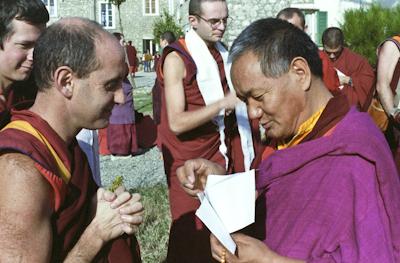Be Brave for Liberation
Lama Yeshe advises students to avoid extremes and abide in meditation with intensive awareness in this short excerpt from a commentary on the yoga method of Gyalwa Gyatso given at Istituto Lama Tzong Khapa, Italy, in September 1983. Edited by Constance Miller.

I often find that Western culture tends toward two extremes. One extreme is a strong belief in an external power. This might be God, or Vishnu, or Buddha. Many people believe, “God will take care of me. Vishnu will give me bread. Buddha will give me love and happiness.” But then, when those people find themselves in difficulty, they think, “God is punishing me; I must deserve it.”
Later, however, they become fed up with thinking in this way and they give up religion altogether. They declare, “That was completely wrong. God is not right; religion is not right. Now I want pleasure, just pleasure, more pleasure. I believe only in pleasure.”
These are the two extremes in Western culture, and both are mistaken. One is the result of fanatic religious belief; the other, of fanatic materialism.
We should try to find the middle way, an approach to life in which there is neither extreme rejection nor extreme acceptance. If you can put your mind into the middle way, the natural state, then you can grow.
It is also the case that we generally try to be logical. We think, “This is so because of that. That is true because of this.” We try to be rational and logical with everything. But then we fall into the trap of believing that everything we do is logical. Thinking that everything is logical is a dualistic concept; it is not necessarily always the right approach to every situation. Meditation implies going beyond rational, philosophical thinking. In meditation, you just be, just abide in your natural experience with intensive awareness. That is the heart of meditation.
Human beings can do great things. When I think about myself and my life, I may be convinced that there are certain things I cannot do. In spite of this, if I put myself in strict retreat conditions, even though I may have doubts, somehow the result of my actions is beneficial. We may believe we have certain limitations, but in retreat you may find that you can go beyond your perceived limitations. Human beings can exceed their own limitations; you can do this. So I want all of you to do a strict, intense retreat here. It is for your own benefit, not mine. Take notice of your mad elephant mind, which is continually dissatisfied. After so many lifetimes, by now you really should realize that it is not worthwhile to give in to this garbage continuously.
Therefore, by the time you have finished the retreat, you should have cleared away at least one corner of the garbage you have piled as high as Mount Everest. Practice like this. Then you will realize what you can do; you will realize that you can achieve what you don’t believe is possible. That is the point. Be brave! We have always been brave for samsara. Now we should be brave for liberation.
